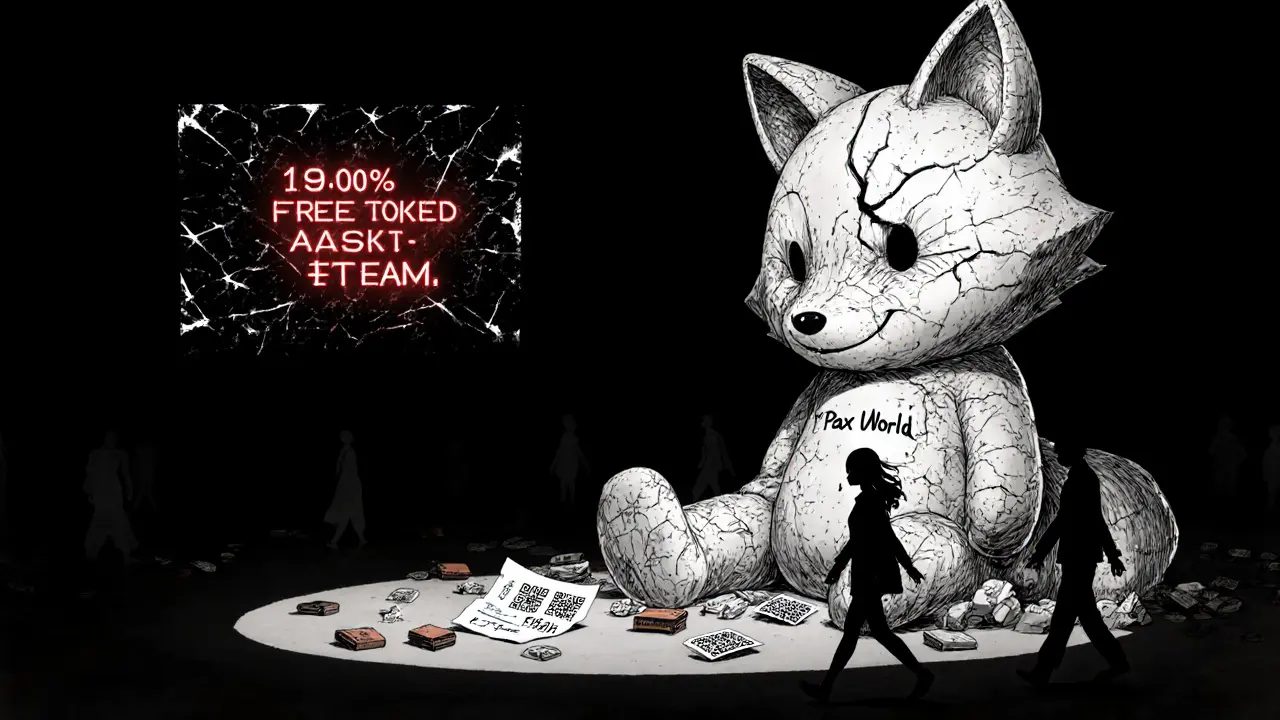Crypto Airdrop Safety Checker
Check Your Airdrop Before You Join
Many airdrops promise free tokens and NFTs, but some are scams. Answer these 4 questions to see if this airdrop is legitimate or potentially dangerous.
Your Airdrop Safety Score
On paper, the Pax.World (PAXW) NFT airdrop sounded like a golden opportunity: free digital assets, a metaverse to explore, and tokens you could stake or sell. But if you participated, you likely got nothing. Not because you missed the deadline. Not because you didn’t follow the rules. But because the project vanished-completely and quietly-over two years ago.
The Promise: Own a Piece of the Virtual World
Pax.World launched in early 2022 with big claims. It said it was building a blockchain-based metaverse where users could buy land, build structures, earn rewards, and even vote on platform decisions. The token, PAXW, was supposed to be the lifeblood of this world. To attract early adopters, they ran an airdrop campaign promising $8 worth of PAXW to 1,000 random participants and $20 to the top 100 referrers. They also teased a separate NFT airdrop through CoinMarketCap Academy, offering up to 1,050 unique digital collectibles. To join, you had to do the usual crypto airdrop checklist: follow their Twitter account, join their Discord and Telegram groups, submit your Polygon wallet address, and retweet a post. It took less than 15 minutes. No technical skills needed. No upfront money. Just your time and trust.The Reality: No Platform, No Updates, No Tokens
Here’s the problem: Pax.World never built anything. By July 2023, every social media channel went silent. No new tweets. No Discord messages. No Telegram updates. The official website, paxinet.io, stopped loading. The GitHub repository? Non-existent. The whitepaper? Never published. The team? Anonymous. No names, no LinkedIn profiles, no public interviews. Just a logo and a promise. The PAXW token, which started at $0.049 during its ICO, crashed to $0.0007182 by mid-2024-a 98.5% drop. It’s still trading on obscure, low-volume exchanges, but no one’s buying. No one’s selling. It’s essentially worthless. And if you thought you’d get those NFTs? CoinMarketCap’s listing appears to be outdated. No one received them. No one even got confirmation they were minted.Why This Isn’t Just a Bad Airdrop-It’s a Red Flag
Most failed crypto projects at least tried. They launched a testnet. They posted progress updates. They answered questions. Pax.World did none of that. Compare it to real metaverse projects like Decentraland or The Sandbox. They raised millions. They hired developers. They built playable worlds. They kept users informed. Pax.World raised $50,000 total. That’s less than what many indie game devs spend on a single asset pack. You can’t build a blockchain metaverse for that. Not even close. And the red flags? They’re everywhere:- No verifiable team-No founders, no developers, no public identities.
- No technical documentation-No smart contract audits, no code, no API docs.
- Social media ghosting-Zero activity since July 2023-over 26 months.
- Community abandonment-Discord servers deleted. Telegram groups vanished.
- Zero user success stories-Reddit, Trustpilot, and Twitter are filled with complaints from people who completed all tasks and received nothing.

What Happened to the People Who Participated?
Thousands of people joined the airdrop. Many spent hours following, sharing, and verifying their wallets. One Reddit user, u/CryptoSkeptic87, wrote in March 2023: “Completed every step. Waited six months. Nothing. Don’t waste your time.” That post got 142 upvotes. Others reported the same. Trustpilot has 37 reviews for Pax.World. Average rating: 1.2 out of 5. The most common comments? “Ghost project.” “Wasted my time.” “Airdrop scam.” CoinGecko listed PAXW as “unlisted,” with user notes saying: “Not tradable anywhere-likely a scam.” Twitter sentiment analysis from 2023 to 2024 showed 92% of mentions were negative. “Abandoned project” was the top phrase. “Airdrop scam” came second.Why Did This Happen?
This wasn’t a technical failure. It was a business failure-and possibly a fraud. The team raised $50,000 by selling 100 million PAXW tokens. That’s a $0.049 price per token. But here’s the twist: they kept 90% of the total supply (900 million tokens) for themselves. That means the team held onto $44.1 million worth of tokens at launch price. Even at today’s price of $0.0007182, that’s still over $640,000 in value. That’s not a startup struggling. That’s a team walking away with half a million dollars after promising a world that never existed. Experts like Dr. Michael Le from UC Berkeley say projects raising under $1 million with no public team or code almost never deliver. Pax.World fits that profile perfectly.
Is There Any Chance It’s Coming Back?
No. Blockchain Capital’s Q3 2024 report states: “Abandoned metaverse projects with no functional product after two years have effectively zero chance of meaningful recovery.” Messari’s 2024 State of Crypto report calls these “zombie protocols.” Their data shows a 99.7% failure rate for projects inactive for 18+ months. Pax.World has been dead for over 26 months. No one’s working on it. No one’s talking about it. No one’s even pretending to care.What You Should Do Now
If you participated in the PAXW airdrop:- Stop checking your wallet. You won’t get tokens or NFTs.
- Don’t send any more crypto to any “Pax.World” address. It’s a phishing trap.
- Report the project to CoinMarketCap and CoinGecko as inactive or fraudulent.
- Share your story. Others are still falling for similar scams.
- Check if the team is real. Look for LinkedIn profiles, past projects, interviews.
- Verify the contract address. Is it audited? Is it on Etherscan or Polygonscan?
- Search Reddit and Twitter for complaints. If people say “ghost project,” believe them.
- Ask: “What have they actually built?” If the answer is “nothing yet,” walk away.
Final Thought: Airdrops Aren’t Free Money-They’re a Test of Trust
Crypto airdrops can be legitimate. Many projects use them to grow communities and reward early supporters. But when a project promises a world and delivers silence, it’s not a mistake. It’s a signal. Pax.World didn’t fail because of bad luck. It failed because it was never real to begin with. Don’t chase the next shiny airdrop. Chase transparency. Chase proof. Chase teams that show up, even when no one’s watching. Because in crypto, the projects that vanish are the ones you never want to remember.Did anyone actually receive PAXW tokens from the airdrop?
No credible reports exist of anyone receiving PAXW tokens from the official airdrop. Thousands of participants completed all required steps-following social media, joining Discord, submitting wallet addresses-but never received tokens. Reddit threads and Trustpilot reviews confirm widespread non-delivery, with users labeling the project a ghost or scam.
Was the Pax.World NFT airdrop real?
The CoinMarketCap Academy listing for a 1,050 NFT airdrop appears to be outdated or misleading. No NFTs were ever distributed, and no functional platform existed to host them. The original Pax.World website and social channels have been inactive since mid-2023, making any NFT distribution claim unverifiable and likely false.
Is PAXW still tradable on exchanges?
PAXW trades at extremely low volumes on obscure decentralized exchanges, with a price of around $0.0007182 as of 2024. It has no market capitalization, no liquidity, and no buyers. Even if you hold the token, you cannot realistically sell it for meaningful value. Most exchanges have delisted it due to inactivity.
Can I recover my lost tokens or time spent on the airdrop?
No. Once a project abandons its platform and vanishes, there is no legal or technical path to recover tokens or compensation. The team behind Pax.World remains anonymous, and no regulatory body has taken action. The only recovery is learning from the experience to avoid similar scams in the future.
How can I spot a fake crypto airdrop before joining?
Check for three things: 1) Is the team public and verifiable? Look for LinkedIn, past projects, interviews. 2) Is there working code or a testnet? Check GitHub or Polygonscan for contract addresses. 3) Are other users complaining? Search Reddit and Twitter for phrases like “ghost project” or “never received.” If any of these are missing, it’s likely a scam.
Was Pax.World a security scam under SEC rules?
Yes, it likely qualifies as an unregistered security offering under the Howey Test. The project promised token holders future value through participation in a virtual world, including land ownership and governance rights-classic indicators of an investment contract. Since no registration was filed with the SEC, this would be considered illegal under U.S. securities law.
What’s the difference between Pax.World and real metaverse projects like Decentraland?
Decentraland raised $29.6 million, has a public team, active developers, a playable world, thousands of daily users, and regular updates. Pax.World raised $50,000, has no team, no code, no users, and zero updates since 2023. One is a functioning platform. The other is a dead project with no future.


13 Responses
This is the most predictable crypto scam I've seen all year. People still fall for this? 🤡
I remember when I did the PAXW airdrop. Thought I was being smart, doing all the steps, sharing the post, joining Discord, even made a spreadsheet to track my participation. Six months later, nothing. Not even a 'thanks for trying.' The silence was louder than any announcement. I learned the hard way that if a project doesn't have a GitHub repo or a single dev profile on LinkedIn, it's not a project-it's a dumpster fire with a whitepaper. And yeah, they kept 90% of the tokens. That's not a startup, that's a heist with a Discord server.
Thank you for this thorough breakdown. It's rare to see such a well-documented case of abandonment in the crypto space. The lack of verifiable team members, combined with the complete erasure of digital presence, is textbook predatory behavior. I hope this serves as a cautionary reference for future airdrop participants.
I’ve been in crypto since 2017 and I’ve seen a lot of ghosts-but Pax.World? That’s a cemetery with a marketing budget. What kills me is how many people still think 'free tokens' means free money. It doesn’t. It means you’re funding someone’s vacation while they ghost you. Don’t be the person who gets scammed twice. Learn. Move on. And tell your friends.
The Howey Test application here is actually quite elegant. The token wasn't utility-it was a claim on future value derived from collective participation in a non-existent ecosystem. Classic securities structure. The fact that no regulatory action was taken speaks volumes about the jurisdictional arbitrage happening in Web3. Also, CoinMarketCap's outdated listing is a systemic failure. They should be liable for hosting zombie assets.
The team kept 90 percent of the supply. That's not incompetence. That's malice. End of story.
It's heartbreaking to see how many people trusted this. I know someone who spent weeks on this airdrop, telling everyone how 'revolutionary' it was. When it vanished, they felt personally betrayed. We need more stories like this to protect new people. Thanks for writing this.
This isn't a scam. It's a psyop. The whole thing was a honeypot to collect wallet addresses and social media handles. They sold the data to hedge funds. That's why they vanished-no need to build a metaverse when you can monetize your victims' digital footprints. Look at the IP addresses from the Discord logs. I bet they all point to one server in Eastern Europe.
I did the airdrop. Got nothing. Then I got DMs from 'Pax.World Support' asking for my seed phrase to 'claim my tokens.' That's when I knew. They weren't just gone-they were hunting. Don't ever give out your private keys. Ever.
I'm new to crypto and this post helped me a lot. I was about to join another airdrop today. Now I'm not. I checked the team, no LinkedIn, no code, no updates. I walked away. Thanks for the clarity.
Why are we still talking about this? It's been dead for two years. The fact that you're still writing about it means you're addicted to the drama. Move on. There are real projects out there. Stop feeding the zombie.
There’s a quiet tragedy here. Not just the money lost, but the trust. People gave their time, their attention, their belief in something that was never real. We live in an age where we’re told everything is a game, a gamble, a hustle. But when you give your time to something that promises community, you’re not just participating-you’re investing your humanity. And then they vanish. No apology. No explanation. Just silence. And we’re supposed to shrug and say, 'Welcome to crypto.' No. We’re supposed to mourn the lost belief. And then build something better.
The absence of a whitepaper is not merely a technical oversight-it is an epistemological failure. A project that cannot articulate its foundational principles in a documented form cannot, by definition, exist as a coherent entity. The silence of the team is not neutrality; it is negation.